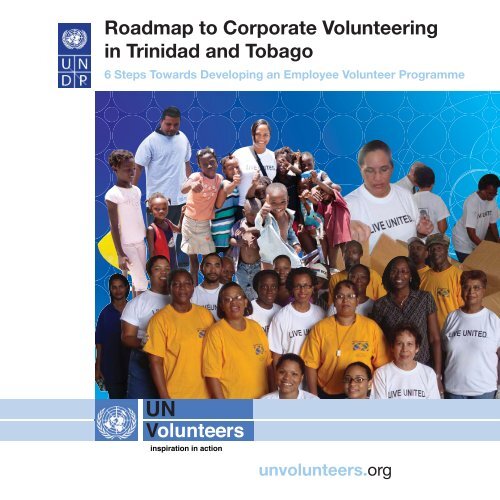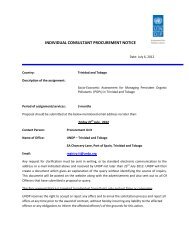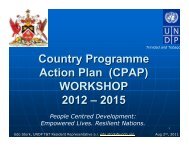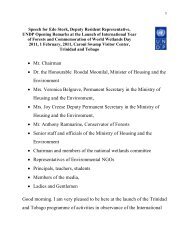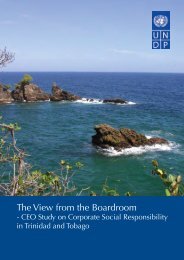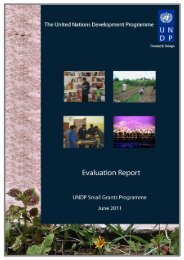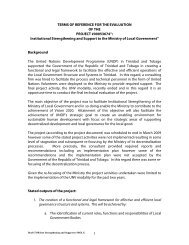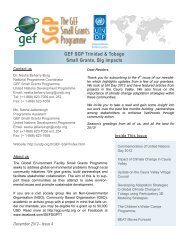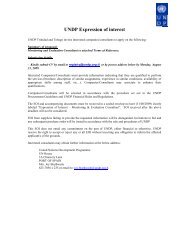Roadmap to Corporate Volunteering 2009 - UNDP Trinidad and ...
Roadmap to Corporate Volunteering 2009 - UNDP Trinidad and ...
Roadmap to Corporate Volunteering 2009 - UNDP Trinidad and ...
You also want an ePaper? Increase the reach of your titles
YUMPU automatically turns print PDFs into web optimized ePapers that Google loves.
<strong>Roadmap</strong> <strong>to</strong> <strong>Corporate</strong> <strong>Volunteering</strong><br />
in <strong>Trinidad</strong> <strong>and</strong> Tobago<br />
6 Steps Towards Developing an Employee Volunteer Programme<br />
unvolunteers.org
“Companies could support corporate volunteering initiatives <strong>and</strong> encourage<br />
their people <strong>to</strong> volunteer their time, skills, expertise <strong>and</strong> passion. <strong>Corporate</strong><br />
investment in volunteers can be cost effective <strong>and</strong> efficient. Volunteers<br />
strengthen development solutions <strong>and</strong> have the capacity <strong>and</strong> knowledge <strong>to</strong> link<br />
know-how with community needs.”<br />
Ad Melkert, UN Under-Secretary General, ‘How philanthropy can contribute <strong>to</strong> the MDGs’, 2008
Foreword<br />
This <strong>Roadmap</strong> intends <strong>to</strong> provide a basic start-up <strong>to</strong>ol kit for those companies in <strong>Trinidad</strong> <strong>and</strong><br />
Tobago that are interested in developing an employee volunteer programme. Over the past few<br />
years, many businesses have indicated their willingness <strong>to</strong> invest in<strong>to</strong> the creation of an internal<br />
volunteer programme that would enable them <strong>to</strong> go beyond the traditional CSR approach of<br />
charitable giving <strong>and</strong> <strong>to</strong> become actively involved in the social <strong>and</strong> environmental development of<br />
the communities in which they operate. At the same time managers have highlighted the fact that<br />
information about the necessary ‘ingredients’ for such a programme compiled <strong>and</strong> presented in a<br />
practical format remained sketchy.<br />
This guide is meant <strong>to</strong> fill this gap. Written for community relations, corporate communications<br />
<strong>and</strong> human resource managers, it is supposed <strong>to</strong> be a conceptual framework for programme<br />
development outlining six generic elements in the process of strategically aligning volunteerism<br />
with business objectives. As such, it is a direct contribution <strong>to</strong>wards the creation of inclusive<br />
business models that include poor people in<strong>to</strong> value chains as producers, employees <strong>and</strong><br />
consumers <strong>and</strong> <strong>to</strong>wards achieving the Millennium Development Goals (MDGs).<br />
Dr. Marcia de Castro<br />
<strong>UNDP</strong> Resident Representative <strong>and</strong><br />
UN Resident Coordina<strong>to</strong>r<br />
<strong>UNDP</strong> <strong>Trinidad</strong> <strong>and</strong> Tobago, Suriname,<br />
Aruba, Curaçao <strong>and</strong> Sint Maarten<br />
Dr. Jens-Ulrich Poppen<br />
UNV Programme Officer<br />
<strong>UNDP</strong> <strong>Trinidad</strong> <strong>and</strong> Tobago, Suriname,<br />
Aruba, Curaçao <strong>and</strong> Sint Maarten<br />
1
What is <strong>Corporate</strong> <strong>Volunteering</strong><br />
<strong>Corporate</strong> or employee volunteering refers <strong>to</strong> the various forms <strong>and</strong> manifestations that civic engagement<br />
by corporate entities <strong>and</strong> their workforce can take. Such engagement is usually carried out in partnership<br />
with the not-for-profit sec<strong>to</strong>r with NGOs being the direct recipients of volunteer support. The term<br />
‘corporate’ can be used <strong>to</strong> include both public <strong>and</strong> private organizations, e.g. privately-owned enterprises,<br />
public utility companies or government ministries, but often deals exclusively with the phenomenon of<br />
business-supported staff volunteerism in the Private Sec<strong>to</strong>r. While this publication addresses primarily<br />
private businesses <strong>to</strong> assist them in their activities in the area of <strong>Corporate</strong> Social Responsibility (CSR), its<br />
generic elements can be equally applied <strong>to</strong> the development of volunteer programmes in the public sec<strong>to</strong>r.<br />
There are probably as many definitions of volunteerism as there are volunteer-involving organizations.<br />
However, practitioners <strong>and</strong> theorists agree on the following core principles as being an essential part of<br />
any conceptual approach <strong>to</strong>wards defining voluntary civic engagement: a) Free will b) No monetary<br />
compensation c) Benefits <strong>to</strong> society or third party.<br />
At the same time, the United Nations Volunteers Programme (UNV) stresses the importance of volunteerism<br />
benefiting “both society at large <strong>and</strong> the individual volunteer by strengthening trust, solidarity <strong>and</strong> reciprocity<br />
among citizens, <strong>and</strong> by purposefully creating opportunities for participation”. In this regard, corporate<br />
volunteerism is no exception <strong>and</strong> any voluntary initiative taken by the Private Sec<strong>to</strong>r <strong>and</strong> its workforce<br />
should be characterized by the basic pillars of un-coerced participation in community outreach, good<br />
citizenship, active neighbourliness <strong>and</strong> social <strong>and</strong> environmental consciousness.<br />
From an employer’s perspective, this requires a commitment <strong>to</strong> encourage staff <strong>to</strong> volunteer in the not-forprofit<br />
sec<strong>to</strong>r <strong>and</strong> can range from individual volunteer efforts <strong>to</strong> team-based projects or activities involving<br />
the whole company. <strong>Corporate</strong> volunteerism is based on the premise that socially responsible behaviour<br />
demonstrated by companies contributes <strong>to</strong> the development of society as a whole. It necessitates the<br />
creation of a ‘<strong>Corporate</strong> Culture of Caring’ in which voluntary contributions <strong>to</strong>wards the Public Common<br />
Good are valued <strong>and</strong> recognized by senior managers.<br />
<strong>Volunteering</strong> makes you feel good. Feeling good<br />
gives you a sense of being much larger than<br />
you regularly are <strong>and</strong> feeling like that more often<br />
may give the volunteer a more permanent sense<br />
of contentment. Extending this well-being <strong>to</strong><br />
those not enough warmed by it may influence an<br />
aspiration <strong>to</strong>wards this experience of inner beauty.<br />
Some people sing because it feels good, some<br />
tend <strong>to</strong> plants <strong>and</strong> some volunteer, all in search of<br />
happiness.<br />
All have the desire of feeling good about what<br />
they do <strong>and</strong> about the effects they have on others.<br />
Volunteerism helps one <strong>to</strong> achieve exactly that.<br />
2<br />
Carol Ragoobar<br />
Underwriter - Commercial<br />
Lines San Fern<strong>and</strong>o Branch<br />
Guardian General
ROADMAP TO<br />
CORPORATE VOLUNTEERING<br />
VISIONING<br />
MISSION,<br />
VISION AND<br />
SOCIAL POLICY<br />
STRATEGY<br />
GOVERNANCE<br />
PLANNING<br />
‘VOLUNTARY<br />
TRIANGLE’<br />
COMPANY<br />
VOLUNTEER<br />
PARTNERING<br />
PROJECT<br />
DEVELOPMENT<br />
TERMS OF<br />
REFERENCE<br />
BUDGET<br />
GENERAL INDUCTION<br />
TRAINING AND DEVELOPMENT<br />
SENSITIZATION<br />
TRAINING<br />
IMPACT ASSESSMENT<br />
TRACKING AND EVALUATION<br />
BENEFITS REALIZATION<br />
ANNUAL VOLUNTEER<br />
REPORT<br />
REPORTING<br />
SUSTAINABILITY REPORT<br />
‘VOLUNTEER OF THE<br />
MONTH’<br />
RECOGNITION<br />
VOLUNTEER AWARDS<br />
3
Visioning<br />
Mission, Vision <strong>and</strong> Social Policy Statements<br />
For employees, being able <strong>to</strong> imagine the ‘bigger picture’ <strong>to</strong> which their activities contribute is a crucially<br />
important motivating fac<strong>to</strong>r <strong>to</strong> volunteer. <strong>Corporate</strong> volunteers need <strong>to</strong> know what their skills will ultimately<br />
contribute <strong>to</strong> <strong>and</strong> what they are setting out <strong>to</strong> create.<br />
Therefore, for any corporate volunteer manager <strong>and</strong> his/her team, the conceptual work starts with envisaging<br />
the future <strong>and</strong> asking a number of questions that would help <strong>to</strong> develop that bigger picture. What precisely<br />
is the volunteer programme’s fundamental objective, its raison d’etre How does the company envision the<br />
community of <strong>to</strong>morrow What kind of environment does it want <strong>to</strong> create through volunteerism<br />
Volunteer vision supports corporate vision. In trying <strong>to</strong> align the two, the idea of ‘Good <strong>Corporate</strong> Citizenship’<br />
could provide the necessary link. Where you want <strong>to</strong> go as a company seeking profits is where you want <strong>to</strong><br />
go as a corporate citizen seeking <strong>to</strong> honour your responsibilities <strong>to</strong> society.<br />
Vision <strong>and</strong> Mission go h<strong>and</strong> in h<strong>and</strong>. With the Mission or Social Policy Statement, the company speaks<br />
directly <strong>to</strong> the passion, aspirations <strong>and</strong> good will of its future volunteers. It reinforces the message that<br />
corporate volunteers can <strong>and</strong> will make a difference <strong>and</strong> describes the corporate identity of organization <strong>and</strong><br />
people.<br />
Defining one’s Mission means defining one’s cause. In a few words, the Mission Statement outlines<br />
corporate philosophy <strong>and</strong> purpose with regards <strong>to</strong> voluntary action. It describes what volunteers will be<br />
doing in supporting such philosophy <strong>and</strong> whom exactly they serve through their activities in the public realm.<br />
Mission <strong>and</strong> Vision concerns everybody. Companies need <strong>to</strong> make all employees part of the journey as well<br />
as part of developing the itinerary.<br />
4
BG employees volunteer their services at a local hospice.<br />
Step One – Visioning<br />
5
Strategy<br />
The Vision provides the backdrop for the strategic planning process <strong>and</strong> the formulation of strategic<br />
goals. As benefits need <strong>to</strong> be realized by all members of the ‘Voluntary Triangle’ – company, employees<br />
<strong>and</strong> community – objectives <strong>to</strong>o need <strong>to</strong> be formulated <strong>and</strong> identified vis-à-vis corporate interests<br />
<strong>and</strong> community expectations respectively. The overarching question is what precisely the volunteer<br />
programme aims <strong>to</strong> accomplish What methods are being employed by managers <strong>to</strong> realize those<br />
accomplishments Formulate your strategic goals as general <strong>and</strong> broadly-worded statements outlining<br />
what needs <strong>to</strong> be accomplished <strong>to</strong> realize your volunteer mission <strong>and</strong> vision.<br />
Ask yourself what value the corporate volunteer programme can deliver <strong>to</strong> both the companies’<br />
position in the marketplace <strong>and</strong> <strong>to</strong> society <strong>and</strong> the environment around it.<br />
Any volunteerism strategy is a declaration of corporate values reflecting the company’s culture, attitude<br />
<strong>and</strong> ‘philosophy’ <strong>to</strong>wards cus<strong>to</strong>mers, markets <strong>and</strong> society. The difference it makes in communities<br />
determines the nature, complexity <strong>and</strong> direction of the objectives it sets out <strong>to</strong> achieve. The objectives<br />
of the volunteer programme need <strong>to</strong> be aligned with the business objectives enabling management,<br />
employees, volunteers <strong>and</strong> community partners <strong>to</strong> underst<strong>and</strong> corporate citizenship <strong>and</strong> economic<br />
interests <strong>to</strong> be complementary.<br />
Being a volunteer strategist means <strong>to</strong> underst<strong>and</strong> what value employees can create for communities.<br />
Such underst<strong>and</strong>ing requires knowledge of the communities themselves <strong>and</strong> the people living in them.<br />
In business, one needs <strong>to</strong> underst<strong>and</strong> the cus<strong>to</strong>mer. As a corporate volunteer manager, one needs<br />
<strong>to</strong> underst<strong>and</strong> the social environment. Thus good corporate citizenship means <strong>to</strong> underst<strong>and</strong> <strong>and</strong><br />
practise both.<br />
6<br />
Gaitrie Persad<br />
Assistant Manager Service <strong>and</strong><br />
Support – Scotiabank Rio Claro<br />
To me, giving back <strong>to</strong> our community goes beyond<br />
monetary donations. We play an integral part in<br />
building our community by creating opportunities<br />
for the children in our Primary Schools. We’ve<br />
assisted in teaching these kids lifelong learning<br />
skills in Gardening, Food <strong>and</strong> Nutrition, Farming<br />
<strong>and</strong> Craft.<br />
This experience will enhance personal<br />
development at the individual level <strong>and</strong> encourage<br />
sustainable growth at the national level. Give a<br />
man a fish, you feed him for one day; teach a man<br />
<strong>to</strong> fish <strong>and</strong> you feed him for life.<br />
Watching these children as they experience the<br />
joys of learning <strong>and</strong> then reaping the fruit of their<br />
hard work is truly an indescribable experience.<br />
Food crops which were grown through this<br />
initiative were distributed <strong>to</strong> less fortunate<br />
families in our Community. The exercise was truly<br />
rewarding <strong>and</strong> beneficial <strong>to</strong> all involved.<br />
Our future depends on our kids; what we teach<br />
them <strong>to</strong>day will help them develop in<strong>to</strong> the leaders<br />
of <strong>to</strong>morrow.
Governance<br />
Establishing a <strong>Corporate</strong> Volunteer Programme requires a collective effort <strong>and</strong> a joint approach.<br />
Rather than placing the responsibility solely on the shoulders of the corporate or community relations<br />
manager, companies should seek <strong>to</strong> develop collective structures of governance by creating an<br />
Employee Volunteer Committee that would assign its members <strong>to</strong> a range of core ‘portfolios’ necessary<br />
for running a sustainable programme.<br />
Step One – Visioning<br />
In those cases in which companies never established a formal programme, the Employee Volunteer<br />
Committee would begin its work by spearheading the Visioning process while ensuring adequate<br />
representation of all departments, sections <strong>and</strong> units within the company. In that way, the programme<br />
would reflect the broadest possible view of employees <strong>and</strong> would also serve as a forum for<br />
brains<strong>to</strong>rming <strong>and</strong> as an ‘incuba<strong>to</strong>r’ for new ideas that would guide the development of new projects<br />
<strong>and</strong> activities. Communicating the work of company volunteers through the Committee would<br />
significantly increase the internal visibility of the volunteer programme, making communication of<br />
upcoming activities more effective.<br />
Buy-in from the Boardroom is crucial for the sustainability of voluntary corporate community work.<br />
Securing it will be one of the most important tasks of committee members who would maintain contact<br />
with <strong>and</strong> appraise senior management of ongoing volunteer activities. Committee members would also<br />
be responsible for establishing <strong>and</strong> maintaining contact with not-for-profit organizations <strong>and</strong> for liaising<br />
with project partners. Furthermore, the Committee’s responsibilities include programme development<br />
<strong>and</strong> project implementation including policy development, regula<strong>to</strong>ry framework, training <strong>and</strong> needs<br />
assessments.<br />
7
COMPANY<br />
PRIVATE<br />
PUBLIC<br />
GOOD CORPORATE CITIZENSHIP<br />
CORPORATE SUSTAINABILITY<br />
SKILLS<br />
CORPORATE VOLUNTEERS<br />
FREE WILL<br />
NO<br />
FINANCIAL<br />
GAIN<br />
GOOD<br />
NEIGHBOURLINESS<br />
SOCIAL<br />
&<br />
ENVIRONMENTAL<br />
CONSCIOUSNESS<br />
MDG2<br />
ACHIEVE<br />
UNIVERSAL<br />
PRIMARY<br />
EDUCATION<br />
MDG3<br />
PROMOTE<br />
GENDER<br />
EQUALITY<br />
AND EMPOWER<br />
WOMEN<br />
MDG1<br />
ERADICATE<br />
EXTREME<br />
POVERTY<br />
BENEFITS<br />
LOCAL COMMUNITIES<br />
NATIONAL COMMUNITIES<br />
MDG4<br />
REDUCE CHILD<br />
MORTALITY<br />
MDG5<br />
IMPROVE<br />
MATERNAL<br />
HEALTH<br />
MDG8<br />
GLOBAL<br />
PARTNERSHIP<br />
FOR<br />
DEVELOPMENT<br />
MDG7<br />
ENSURE<br />
ENVIRONMENTAL<br />
STABILITY<br />
MDG6<br />
COMBAT<br />
HIV/AIDS<br />
MALARIA<br />
& OTHER<br />
DISEASES<br />
8
Planning<br />
The ‘Voluntary Triangle’<br />
Three sets of interests, aims <strong>and</strong> aspirations need <strong>to</strong> be reconciled <strong>and</strong> aligned with each other in any corporate<br />
volunteer activity, namely that of company, community <strong>and</strong> employee. This ‘Voluntary Triangle’ forms the basis for<br />
any subsequent planning exercise <strong>and</strong> only its careful consideration in the pre-implementation phase ensures the<br />
longevity, viability <strong>and</strong> success of the company’s volunteer programme.<br />
Step Two – Planning<br />
The first element in the triangle is the company. The choice of location, partner organization <strong>and</strong> communal focus<br />
adopted by the company in pursuit of its volunteer programme is being determined by the nature, market <strong>and</strong><br />
social environment of its commercial activities. In order <strong>to</strong> provide the necessary context a number of pertinent<br />
questions need <strong>to</strong> be asked: What is the company’s core business What are the basic features of its market<br />
What services or products does it offer <strong>and</strong> produce And how can socially responsible corporate behaviour<br />
support its competitiveness, productivity <strong>and</strong> cus<strong>to</strong>mer base<br />
Then there is the community. Rather than relying on anecdotal evidence, media reports, hearsay or past activities,<br />
corporate volunteerism needs <strong>to</strong> reliably identify community needs through a thorough situation analysis. Once<br />
social ills have been identified through a Community Needs Assessment, the company then needs <strong>to</strong> establish a<br />
ranking system according <strong>to</strong> severity, nature <strong>and</strong> urgency of the problem <strong>and</strong> <strong>to</strong> select the most pressing issue(s)<br />
as targets for intervention by its employee volunteers.<br />
However, successful programme planning rests ultimately on the strategic mobilization of employees. Mobilization<br />
efforts require programme managers <strong>to</strong> know about the individual interests of their employees across different<br />
areas of volunteering – senior citizens, children, health issues or environmental conservation <strong>to</strong> name only a few<br />
– <strong>and</strong> the skills that employees can bring <strong>to</strong> projects. Research has shown that by taking personal interest in<strong>to</strong><br />
account when developing new projects, many more employees feel motivated <strong>to</strong> volunteer.<br />
An<strong>to</strong>nia Lucky<br />
<strong>Corporate</strong> Lead,<br />
Environment, Health <strong>and</strong><br />
Safety, NGC<br />
<strong>Volunteering</strong> <strong>to</strong> assist NGC events has afforded<br />
me the opportunity <strong>to</strong> selflessly give back <strong>to</strong> my<br />
community <strong>and</strong> my company <strong>and</strong> establish selfworth.<br />
By reaching out <strong>and</strong> participating in worthy<br />
causes, I always found the experiences enriching,<br />
especially when it involved challenges, as these<br />
opportunities allowed me <strong>to</strong> be more focused,<br />
committed, dedicated <strong>and</strong> driven...something we<br />
all need in life <strong>to</strong> get by.<br />
<strong>Volunteering</strong> helped me <strong>to</strong> not only enjoy my basic<br />
interests, but also <strong>to</strong> explore associated concerns<br />
within community homes, family life <strong>and</strong> other<br />
industries <strong>and</strong> allow me <strong>to</strong> use my academic <strong>and</strong><br />
professional skills <strong>to</strong> assist.<br />
Many were the times that I learned <strong>and</strong> gained<br />
more information about a particular cause or<br />
vocation that I <strong>to</strong>ok for granted in the past or just<br />
knew little about.<br />
<strong>Volunteering</strong> <strong>and</strong> participating gave me the<br />
chance <strong>to</strong> develop my abilities, skill <strong>and</strong> personal<br />
strengths. I learnt intercultural communication <strong>and</strong><br />
teamwork dynamics <strong>and</strong> that the power of many is<br />
better than just one person.<br />
9
VOLUNTARY TRIANGLE<br />
COMPANY<br />
Service<br />
Market<br />
Product<br />
Cus<strong>to</strong>mer<br />
EMPLOYEE<br />
Skills<br />
Interests<br />
COMMUNITY<br />
Social <strong>and</strong><br />
Environmental Needs<br />
10
Company Volunteer Policy<br />
<strong>Corporate</strong> volunteers are ‘ambassadors’ for the company representing its economic interests <strong>and</strong><br />
personifying its social integrity. They should be seen as exemplary cases of corporate ethics <strong>and</strong> as<br />
guaran<strong>to</strong>rs of the company’s reputation among members of the public. They need <strong>to</strong> be provided with a<br />
clear policy framework that outlines both obligations <strong>and</strong> entitlements during their voluntary assignments.<br />
Step Two – Planning Step -<br />
Policies increase the level of accountability, st<strong>and</strong>ardization, formalization <strong>and</strong> fairness. They are<br />
guidelines that set out both the broader principles governing volunteer commitments as well as the more<br />
concrete rules <strong>and</strong> regulations determining operationally relevant issues. Those issues can include:<br />
Time management – Does the company operate a<br />
paid time-off programme or has it adopted a dollars-fordoers<br />
approach<br />
Eligibility – What individual profile does the employee<br />
need <strong>to</strong> bring <strong>to</strong> the volunteer assignment<br />
Enrolment – Outline a possible selection process <strong>and</strong><br />
clarify what written commitment is expected from the<br />
volunteer.<br />
Induction <strong>and</strong> training – What kind of orientation can<br />
be expected <strong>and</strong> how does the company treat with<br />
training requirements.<br />
Expenses – While volunteers are working without<br />
remuneration, they should not have <strong>to</strong> shoulder<br />
additional expenses while volunteering for the company.<br />
Supervision – Who do corporate volunteers report <strong>to</strong><br />
Code of Conduct – <strong>Corporate</strong> volunteers need <strong>to</strong><br />
be acquainted with the do’s <strong>and</strong> don’ts of interacting<br />
with partners <strong>and</strong> community members in an official<br />
capacity.<br />
Evaluation – Upon completion of a volunteer<br />
assignment, what process exists <strong>to</strong> evaluate its impact<br />
Reporting – What are the reporting requirements for<br />
volunteers during <strong>and</strong> after their assignment<br />
Health <strong>and</strong> Safety – How does the company<br />
ensure the volunteer’s physical well-being during the<br />
assignment <strong>and</strong> what safety measures have been put<br />
in place<br />
Confidentiality – Sensitive information about projects,<br />
partners <strong>and</strong> people need <strong>to</strong> stay within the confines of<br />
the company.<br />
Enabling volunteers <strong>to</strong> familiarize themselves with the company’s volunteer policy <strong>and</strong> agreeing <strong>to</strong><br />
its binding character forms an important part of the company’s risk management. Therefore, every<br />
volunteer needs <strong>to</strong> be provided with a copy of the policy upon entering the programme.<br />
11
Partnering<br />
A successful partnership with a carefully chosen non-for-profit organization is a crucially important<br />
prerequisite for operating a sustainable volunteer programme <strong>and</strong> for ensuring that the volunteer<br />
project creates value for its beneficiaries in fenceline communities <strong>and</strong> other public spaces.<br />
Managing expectations on both sides of the partnership with regards <strong>to</strong> the level of organizational<br />
commitment, <strong>to</strong> the outputs produced <strong>and</strong> outcomes generated as well as <strong>to</strong> the resources allocated<br />
will determine if volunteer projects become reasons for celebration or a trigger for corporate hang-over.<br />
If larger financial investments are being made in<strong>to</strong> projects <strong>and</strong> project partners, companies will<br />
want <strong>to</strong> develop a clear underst<strong>and</strong>ing of the capacity of NGOs <strong>to</strong> implement complex development<br />
operations. Only if partners in civil society possess the ability <strong>to</strong> organizationally cope with the<br />
dem<strong>and</strong>s of project implementation <strong>and</strong> financial <strong>and</strong> human resource management can co-operation<br />
with the Private Sec<strong>to</strong>r turn in<strong>to</strong> a mutually beneficial endeavour.<br />
Project Development<br />
Now that the key planning elements are known – volunteer skills available, employee interests known,<br />
community needs mapped <strong>and</strong> non-profit partners identified – concrete projects can be developed.<br />
Based on the ranking of community needs detected, the company <strong>to</strong>gether with its partner NGO can<br />
decide on the exact configuration of volunteer engagement, e.g. team-based onsite volunteering,<br />
men<strong>to</strong>ring, online volunteering as well as determine the location of the project, expected benefits,<br />
timescale, costs, supervision <strong>and</strong> project management as well as major risks.<br />
12<br />
Cherise Outridge<br />
Accountant, BG<br />
I really believe in the saying “treat others as you<br />
would like <strong>to</strong> be treated, have respect <strong>and</strong> love for<br />
your fellow man”. I look at others who are so less<br />
fortunate than myself <strong>and</strong> I wish I could just help<br />
all of them, however, my consolation is that if I can<br />
help but at least one I have made a difference in<br />
someone’s life.<br />
I never look for thanks because just seeing the joy<br />
on the person’s face, knowing that I have helped<br />
even one person for a moment greatly uplifts<br />
my heart. Working at BG makes me feel proud<br />
because I have been priviledged <strong>to</strong> see what goes<br />
on behind the scenes <strong>and</strong> how many people we<br />
really reach out <strong>to</strong> <strong>and</strong> help.<br />
I do volunteer work on my own <strong>to</strong> read <strong>to</strong> children<br />
stricken with cancer <strong>and</strong> <strong>to</strong> help the homeless, <strong>and</strong><br />
this year it was really heartwarming <strong>to</strong> be directly<br />
involved with the volunteer work at BG when we<br />
have had our Positive Energy weeks, <strong>and</strong> I look<br />
forward <strong>to</strong> continuing <strong>to</strong> help as much as I can.
Public Utilities Minister Emmanuel George (centre) poses with TSTT’s PR Head Camille Sal<strong>and</strong>y (<strong>to</strong> his left),<br />
VP of Cus<strong>to</strong>mer Care Dianna De Souza (<strong>to</strong> his right), Barcam CEO Selvyn Lewis, <strong>Corporate</strong> <strong>and</strong> Community<br />
Affairs Manager Trudy De Verteuil (second from right) <strong>and</strong> some of the many camp participants.<br />
Step Two – Planning<br />
Participation in Methanex’s ‘Men<strong>to</strong>ring Our<br />
Children’ programme since its inception in 2007<br />
has been an inspiring <strong>and</strong> phenomenal experience<br />
for my entire family.<br />
The programme engages employees in motivating<br />
<strong>and</strong> guiding high potential teenage students from<br />
low-income families in creating a brighter future<br />
<strong>and</strong> s<strong>to</strong>pping the cycle of poverty.<br />
All it takes is some of our time <strong>and</strong> encouragement<br />
<strong>to</strong> help children recognize their potential <strong>and</strong> value.<br />
I encourage volunteerism – it is rewarding for those<br />
who receive <strong>and</strong> those who give.”<br />
Sundar Harkoo<br />
Operations Shift Supervisor<br />
Methanex <strong>Trinidad</strong> Limited<br />
13
Terms of Reference<br />
While volunteering is strongly driven by personal considerations of showing solidarity with the<br />
less fortunate <strong>and</strong> accompanied by the often heard motivation of ‘giving back’, in its corporate<br />
manifestation it should be seen <strong>and</strong> treated also as an integral part of the business with employees<br />
committing <strong>to</strong> the delivery of voluntary services within the scope of the project, on time <strong>and</strong> within<br />
budgetary limits. Such commitment requires the volunteer <strong>to</strong> be provided with the Terms of Reference<br />
(TOR) including a clear description of the qualifications <strong>and</strong> skills required, the tasks <strong>and</strong> deliverables <strong>to</strong><br />
be produced <strong>and</strong> the process of completing the assignment <strong>to</strong> be followed. The TOR should also entail<br />
a brief description of the project.<br />
Budget<br />
While volunteers provide their services pro bono, companies need <strong>to</strong> include the corporate volunteer<br />
programme in<strong>to</strong> their financial planning cycle. Costs are likely <strong>to</strong> include the training of volunteers for<br />
specific assignments, the matching of funds for employee-organized fundraisers, the matching of the<br />
financial equivalent of volunteer hours spent, the purchase or rental of technical equipment necessary<br />
for the implementation of projects as well as database maintenance, transport, food <strong>and</strong> beverages<br />
<strong>and</strong> expenses for volunteer recognition, e.g. awards. Budgetary allocation will also have <strong>to</strong> be made <strong>to</strong><br />
ensure that successes <strong>and</strong> achievements by company volunteers are effectively communicated both<br />
within the company as well as <strong>to</strong> external stakeholders via modern media <strong>and</strong> communication <strong>to</strong>ols.<br />
The budget may also have <strong>to</strong> make allocations for a Programme Manager or a member of staff who<br />
will be responsible for the month-<strong>to</strong>-month running of volunteer projects.<br />
14<br />
Nera Narine<br />
Operations Officer<br />
RBTT<br />
I recognize that there are many underprivileged<br />
persons who did not get the opportunity <strong>to</strong><br />
advance themselves academically <strong>and</strong> I have a<br />
deep passion <strong>to</strong> reach out <strong>to</strong> such persons <strong>to</strong><br />
share my knowledge with them. On hearing about<br />
the Adult Literacy Tu<strong>to</strong>rs’ Association (Alta), I<br />
signed up because I knew it was something that<br />
I was capable of doing <strong>and</strong> that I would be giving<br />
back <strong>to</strong> my society. I also benefit from my role as<br />
a tu<strong>to</strong>r with Alta, from my teen life I was always<br />
<strong>to</strong>ld that I needed <strong>to</strong> be more confident <strong>and</strong> I<br />
recognized I could use Alta as a medium for self<br />
development <strong>and</strong> self fulfilment.<br />
By interacting with individuals who could not<br />
read <strong>and</strong> write on an individual <strong>and</strong> group basis,<br />
I became more confident <strong>and</strong> able <strong>to</strong> address a<br />
room full of people.
Atlantic LNG employees <strong>and</strong> their children clean up La Brea Station Beach.<br />
Step Two – Planning<br />
15
Training <strong>and</strong> Development<br />
Training may be provided by companies or it may be organized by their not-for-profit partners. Training<br />
may take the form of a general orientation session for volunteers before commencing with their project<br />
work a specifically tailored response <strong>to</strong> an identified lack of skills in anticipation of working with groups<br />
of individuals – e.g. persons with disabilities or children – that require the volunteers <strong>to</strong> observe specific<br />
‘rules of engagement’.<br />
Sensitization of volunteers in preparation for working in different socio-cultural environments plays an<br />
important role in the training <strong>and</strong> should be seen as an indispensable element of risk <strong>and</strong> reputation<br />
management. More general induction sessions should draw on the experience of volunteer ‘alumni’ or<br />
‘veterans’ whose insights in<strong>to</strong> the dynamics <strong>and</strong> specific challenges of community work often prove <strong>to</strong><br />
be invaluable.<br />
The most important thing about volunteering is<br />
<strong>to</strong> be absolutely passionate. Giving your own<br />
time is something very precious, something the<br />
experience of which goes beyond words.<br />
I have been involved with the TSTT Foundation<br />
since <strong>2009</strong> <strong>and</strong> focus on the annually held Sports<br />
Camps that are giving children from a number of<br />
homes <strong>and</strong> orphanages an opportunity <strong>to</strong> spend<br />
a week with their peers playing, learning <strong>and</strong><br />
meeting some of their sporting heroes in person.<br />
Working as a volunteer with these kids was really<br />
an eye-opener for me <strong>and</strong> has taught me the<br />
value of employers enabling their staff <strong>to</strong> become<br />
involved in the lives <strong>and</strong> well-being of others less<br />
fortunate.<br />
16<br />
Carla Griffith-Roberts<br />
Assignment Clerk II<br />
TSTT
Unit Trust Corporation staffers participate in volunteerism.<br />
Step Three – Training & Development<br />
17
Tracking <strong>and</strong> Evaluation<br />
Programme activities need <strong>to</strong> be tracked <strong>and</strong> volunteer projects moni<strong>to</strong>red <strong>and</strong> evaluated. While<br />
tracking helps <strong>to</strong> develop the bigger picture through quantitative data collection, evaluation provides a<br />
more holistic method of examination that includes the analysis of benefits realized <strong>and</strong> lessons learned<br />
while helping. Evaluation helps volunteer managers <strong>to</strong> document the social <strong>and</strong> environmental impact<br />
projects have had as well as <strong>to</strong> detect flaws, bottlenecks <strong>and</strong> conceptual deficiencies that prevent<br />
volunteers from maximizing their potential.<br />
Programme information that can be tracked includes the number of employees mobilized, the<br />
frequency of their participation, <strong>to</strong>tal volunteer hours served, types of not-for-profit organizations<br />
partnered with <strong>and</strong> range of services delivered by volunteers.<br />
On the other h<strong>and</strong>, impact evaluation seeks <strong>to</strong> gauge <strong>and</strong> document the difference that volunteer<br />
contributions have made in communities. It looks at the kind of activities volunteers were involved in<br />
<strong>and</strong> the kind of results they produced <strong>and</strong> can be carried out by using a range of <strong>to</strong>ols for gathering<br />
qualitative information such as questionnaires <strong>and</strong> focus group research.<br />
18
Step Four – Tracking & Evaluation<br />
TSTT employee<br />
participates in the<br />
Moms for Literacy<br />
Programme.<br />
19
Reporting<br />
Volunteer managers need <strong>to</strong> communicate information about the programme <strong>to</strong> senior management,<br />
individual volunteers <strong>and</strong> the external stakeholder community throughout the year. Thereby they present the<br />
volunteer achievements in the broader context of the company’s CSR activities <strong>and</strong> stimulate the interest<br />
of prospective volunteers while at the same time providing justification for future corporate investments in<strong>to</strong><br />
volunteering.<br />
The reporting on volunteer projects can be integrated in<strong>to</strong> the existing sustainability reporting framework or be<br />
presented in a separate quarterly or annual <strong>Corporate</strong> Volunteer Report.<br />
Reporting aims <strong>to</strong> show the measurable <strong>and</strong> tangible difference that the engagement of corporate volunteers<br />
has made in communities <strong>and</strong> through partnerships with non-for-profit organizations. It is a management <strong>to</strong>ol<br />
that ensures accountability <strong>and</strong> the timely disclosure of statistical <strong>and</strong> other information about the communal<br />
<strong>and</strong> environmental engagement of company volunteers. As such, any volunteer report should include (but not<br />
be limited <strong>to</strong>) the following aspects:<br />
• Numerical strength of the existing volunteer force – How many volunteers served during the year<br />
• Volunteer Time – How many volunteer hours were spent<br />
• Project Digest – How many projects, initiatives <strong>and</strong> activities were organized by the volunteer programme<br />
• Partner Profiles – Description of the non-for-profit organizations that the company partnered with.<br />
• Comparative performance – How has volunteer performance improved (or become less effective) over a<br />
number of years What lessons have been learned<br />
Reporting on corporate volunteer performance as an integral part of CSR should address <strong>and</strong> highlight<br />
successes <strong>and</strong> achievements as much as challenges, difficulties <strong>and</strong> shortcomings. The Global Reporting<br />
Initiative’s (GRI) Sustainability Reporting Framework is an agreed <strong>and</strong> useful reference <strong>to</strong>ol <strong>to</strong> seek assistance<br />
in reporting on corporate volunteer performance.<br />
20<br />
Dalia King<br />
Company Secretary<br />
Firstline Securities<br />
<strong>Volunteering</strong> as part of my job sweetens the pot<br />
of my work life. <strong>Volunteering</strong> with teammates is<br />
even better as we get <strong>to</strong> bond beyond the walls<br />
of the office <strong>and</strong> the atmosphere becomes much<br />
more familial even when we return <strong>to</strong> work. Some<br />
may think this affects professionalism <strong>and</strong> they<br />
are correct. My experience has been that when I<br />
volunteer with my colleagues under the auspices<br />
of my job, we become a more effective work unit.<br />
In addition, I cannot quantify or qualify the<br />
satisfaction I get from volunteering. It is both<br />
priceless <strong>and</strong> unrivalled. We are more than just<br />
our jobs <strong>and</strong> we should strive <strong>to</strong> have an imprint<br />
on more than just the lives of those only very<br />
close <strong>to</strong> us. <strong>Volunteering</strong> allows me <strong>to</strong> reach out<br />
<strong>to</strong> strangers <strong>and</strong> in little ways, change lives for<br />
the better. Hour by hour, individual by individual,<br />
volunteerism is a world changer.”
Step Five – Reporting<br />
Jason Thomson was welcomed <strong>to</strong> the Campaign Team in the capacity of Campaign Marketing Officer.<br />
In this picture Jason installs an aquarium <strong>and</strong> fish for the children of the Cyril Ross Nursery.<br />
21
Recognition<br />
Applauding <strong>and</strong> celebrating the achievements of employees in the workplace is a well established Good<br />
Practice in any Human Resource Department. Such recognition should not only be limited <strong>to</strong> the staff<br />
member’s commercial performance <strong>and</strong> his/her contribution <strong>to</strong>wards greater productivity, technical<br />
innovation <strong>and</strong> improved cus<strong>to</strong>mer relations. It should also extend <strong>to</strong> the employee’s performance as a<br />
volunteer in support of the company’s social investment. Without recognition or some reward system, no<br />
programme is likely <strong>to</strong> gain the interest of employees. The following are some recommendations of how <strong>to</strong><br />
recognize corporate volunteers:<br />
• Internal recognition on a small scale – This could be an interview in the company newsletter or an article<br />
on the company website mentioning individual employees involved.<br />
• Internal recognition on a periodic basis – Announce the ‘Volunteer of the Month’ within the company.<br />
• Internal recognition ‘from the <strong>to</strong>p’ – It greatly matters when the Boardroom <strong>and</strong> senior managers<br />
recognize <strong>and</strong> thank employees personally. A thank you card would do. Lunch with the CEO would be<br />
great. Such small gestures go a long way.<br />
• Internal recognition on a large scale – The Company could hold an annual <strong>Corporate</strong> Volunteer Award<br />
ceremony expressing its gratitude <strong>to</strong>wards corporate volunteers more publicly <strong>and</strong> within a celebra<strong>to</strong>ry<br />
framework.<br />
• Recognition through affiliation – Create a ‘<strong>Corporate</strong> Volunteer Yearbook’ or ‘Alumni Direc<strong>to</strong>ry’ complete<br />
with pho<strong>to</strong>s, quotes <strong>and</strong> short biographies.<br />
• External recognition – Informing the public about successful volunteer initiatives by placing occasional<br />
adver<strong>to</strong>rials in local newspapers <strong>and</strong> mentioning participating employees by name <strong>and</strong> through pho<strong>to</strong>s.<br />
22
Step Six – Recognition<br />
United Way Volunteers, who made the day a memorable one.<br />
23
Edi<strong>to</strong>rial Responsibility: Dr. Jens-Ulrich Poppen<br />
The views expressed in this publication are those of the author <strong>and</strong> do not necessarily represent those of the United<br />
Nations, UNV or <strong>UNDP</strong>. Neither <strong>UNDP</strong> nor UNV endorses any of the companies that have nominated individual<br />
volunteers for being interviewed <strong>and</strong> featured in this publication.<br />
The United Nations Volunteers (UNV) programme is the UN organization that contributes <strong>to</strong> peace <strong>and</strong> development<br />
through volunteerism worldwide. Volunteerism is a powerful means of engaging people in tackling development<br />
challenges, <strong>and</strong> it can transform the pace <strong>and</strong> nature of development. Volunteerism benefits both society at large<br />
<strong>and</strong> the individual volunteer by strengthening trust, solidarity <strong>and</strong> reciprocity among citizens, <strong>and</strong> by purposefully<br />
creating opportunities for participation. UNV contributes <strong>to</strong> peace <strong>and</strong> development by advocating for recognition<br />
of volunteers, working with partners <strong>to</strong> integrate volunteerism in<strong>to</strong> development programming, <strong>and</strong> mobilizing an<br />
increasing number <strong>and</strong> diversity of volunteers, including experienced UNV volunteers, throughout the world. UNV<br />
embraces volunteerism as universal <strong>and</strong> inclusive, <strong>and</strong> recognizes volunteerism in its diversity, as well as the values<br />
that sustain it: Free Will, Commitment, Engagement <strong>and</strong> Solidarity.<br />
24
“Habitat is a volunteer-driven organization as we rely heavily on volunteers <strong>to</strong><br />
help families in need realizing their dreams of owning a decent, affordable home.<br />
Volunteers can be seen giving of their time <strong>and</strong> skills in nearly all aspects of our<br />
operations. That is, working on our construction sites, helping <strong>to</strong> produce our<br />
newsletter, manning special events, sitting on various subcommittees, designing<br />
our homes, etc. <strong>Corporate</strong> volunteers see the need of not just supporting through<br />
funding but by giving back in sweat through hard labour. These volunteers have<br />
helped <strong>to</strong> change the working environment, being thankful for not just their life<br />
<strong>and</strong> jobs but also their colleagues when seeing the <strong>to</strong>getherness in giving back.”<br />
Julien Chester, Volunteer <strong>and</strong> Alliance Officer<br />
Habitat for Humanity <strong>Trinidad</strong> <strong>and</strong> Tobago<br />
25
United Nations Development Programme<br />
<strong>Trinidad</strong> & Tobago, Suriname, Aruba, Curaçao <strong>and</strong> Sint Maarten<br />
UN House, 3A Chancery Lane, P.O. Box 812, Port of Spain, <strong>Trinidad</strong><br />
Telephone: 1.868.623.7056 • Website: www.undp.org.tt<br />
unvolunteers.org


